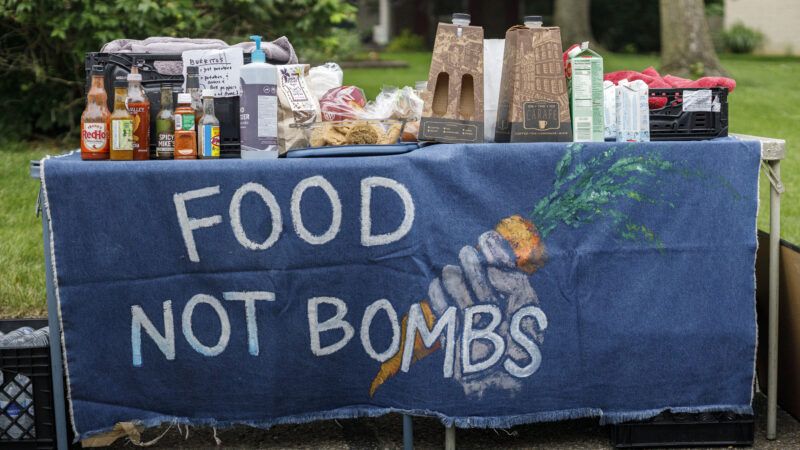Houston Faces First Amendment Lawsuit for Cracking Down on Feeding the Homeless
Food Not Bombs activists argue that feeding the needy is core political speech, and that they don't need the city's permission to do it.

For months, Houston police have been citing and arresting local volunteers for the radical act of feeding the needy. Now the city is facing a lawsuit alleging that its crackdown on charitable giving violates the First Amendment.
The Texas Civil Rights Project filed a federal civil rights lawsuit Wednesday on behalf of the Houston chapter of Food Not Bombs (FNBH), a volunteer group that distributes free food in cities worldwide. Since last March, Houston has been trying to force FNBH activists and other volunteers to move their charitable food services to a city-approved parking lot rather than near the downtown library where they had been operating with the city's consent for more than a decade. According to the suit, FNBH members have received over 89 citations from police so far, amounting to $178,000 in fines.
The suit argues that Houston's anti–food sharing ordinance is unconstitutional both on its face and as applied to FNBH by imposing an invalid prior restraint on the activists' protected First Amendment rights. The city is also violating FNBH's right to expressive association, the group argues, by attempting to force them to move to the parking lot, which happens to be next to a Houston Police Department building and is patrolled by several officers during events.
Randy Hiroshige, a Texas Civil Rights Project attorney, says the issue isn't just about handing out sandwiches; it's about the government trying to suppress political speech.
"They're a protest group," Hiroshige says of Food Not Bombs. "They want to be visible, and the reason they conduct their food sharing is to show the public what it looks like when a community looks out for each other's needs and really provides mutual aid to one another."
FNBH and other groups had been operating outside the library with the city's consent since the 2012 ordinance was passed, but city officials now say the situation is a health and safety issue. Former Houston Mayor Sylvester Turner suggested that the charity operations were driving families away from the library.
The city is not opposed to groups feeding those who are homeless. But doing it in front of the central library is discouraging families, children and others from using it. After people provide the food, they leave but those who are homeless camp around the library and stay. st
— Sylvester Turner (@SylvesterTurner) August 4, 2023
FNBH's lawsuit notes that they serve food at 7:30 at night, well after the library has closed.
The city's attempts to enforce the ordinance, which outlaws providing free food to more than five people "in need" at outdoor locations without permission, have not gone well. One activist was acquitted, while other cases have been dismissed and delayed because prosecutors can't find jurors who are willing to fine people $500 for the crime of feeding the needy.
The city of Houston may not fare much better in civil court either. In 2014, the city of Dallas was forced to rewrite its food safety regulations and pay two ministries $250,000 after the ministries won a lawsuit challenging restrictions on charitable giving.
Similar cases have popped up elsewhere. The U.S. Court of Appeals for the 11th Circuit ruled in 2018 that distributing food was "expressive conduct" protected under the First Amendment. That decision was a response to a lawsuit by the Food Not Bombs chapter in Fort Lauderdale.
As Reason has previously reported, crackdowns on good Samaritans began spreading across the country during the first decade of the century, and that trend has accelerated in recent years as the number of homeless people in the U.S. has surged to record highs. Anti-camping and anti-panhandling laws are also proliferating.
"The city is also sending a message that they don't want unhoused people to be visible to the public," Hiroshige says. "And so in addition to this crackdown on the protected activity of food sharing, there's also just this deeper trend of cities trying to remove unhoused people from the public sphere."
The Houston mayor's office did not immediately respond to a request for comment.
Show Comments (12)